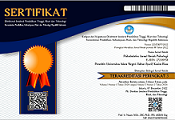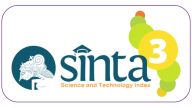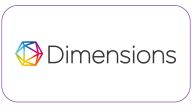Memahami Pandemi Covid-19 Dalam Perspektif Psikologi Sosial
Abstract
Pandemi COVID-19 menjadi fokus perhatian dunia saat ini. Penyebaran COVID-19 terus terjadi secara cepat dan luas, yang berdampak pada kehidupan sosial manusia, salah satunya adalah psikologi dan perilaku manusia. Tulisan ini mencoba membahas pandemic COVID-19 dalam perspektif psikologi sosial, yang terdiri dari beberapa bagian. Pertama, membahas tentang pandemi psikologi, karakteirisk dan dampaknya, kedua, dampak pandemi COVID-19 pada proses kognisi, emosi dan perubahan perilaku di masyarakat. Ketiga, dinamika pengaruh sosial dan konformitas dan terakhir apa yang bisa kita lakukan dalam menghadapi COVID-19. Pandemi COVID-19 telah menyebabkan terjadi banyak bias kognisi sosial yang berpotensi mempengarusi emosi dan perubahan perilaku individu. Peran pemerintah dan perilaku kooperatif masyarakt sangat membantu dalam mengurangi penyebaran dan mitigasi COVID-19. Implikasi dan rekomendasi akan dibahas dalam artikel ini dalam perspektif Psikologi sosial.
Full Text:
PDFReferences
Agung, I.M, Dinamika Kelompok Perspektif Psikologi Sosial (Group Dynamics of Social Psychological Perspective) (October 13, 2013). Bab ini dipublis di buku Psikologi Social 2. Oleh Mirra, dkk., 2013. Hal, 1-35, Pekanbaru:Al-Mujahadah Press. at SSRN: https://ssrn.com/abstract=2593639.
APA (2020). With the number of COVID-19 cases increasing every day, psychologists offer insights on how to separate yourself from others, while still getting the social support you need. Dari https://www.apa.org/practice/programs/dmhi/research-information/social-distancing
Baron, R. A., & Byrne, D. (2003). Psikologi sosial 1(10th ed.). Boston: Allyn and Bacon.
BBC (2020). 'Cuma flu biasa': Pernyataan-pernyataan kontroversial seputar virus corona dari para pemimpin dunia. Diakses dari https://www.bbc.com/indonesia/dunia-52181181
Bordens, K,S & Horowitz, I,A. (2008). Social Psychology. 3rd Edition. Freeload press.
Blakeya, S.M, & Deacon, B.J. (2015). If a Safety Aid is Present, There Must be Danger: The Paradoxical Effects of Hand Sanitizer during a Contamination Exposure Task. Journal of Experimental Psychopathology , 6 (3), 1-14 ,DOI:10.5127/jep.040814.
Brannon,L, Feist, J , Updegraff, J.A(2018) . Health Psychology: An Introduction to Behavior and Health:Boston Cengage Learning.
Brooks S.K., Webster R.K.,& Smith L.E (2020). The psychological impact of quarantine and how to reduce it: rapid review of the evidence. Lancet,395:912–920.
Bond, R & Smith, P.B.(1996). Culture and Conformity: A Meta-Analysis of Studies Using Asch's (1952b, 1956) Line Judgment Task. Psychological Bulletin, 119(1),111-137.
Bracha,A & Brown, D,J (2010) . Affective Decision Making: A Theory of Optimism Bias.diakses tanggal 12 April 2020 dari https://www.bostonfed.org › Workingpapers › PDF
Cnbcindoesia (2020). 1,5 Juta Masyarakat RI Kehilangan Pekerjaan karena COVID-19.diakses tanggal 10 April 202- dari https://www.cnbcindonesia.com/news/.
Dong L, & Bouey J (2020). Public mental health crisis during COVID-19 pandemic, China. Emerging Infection Diseases.7, 23-26 https://doi.org/10.3201/eid2607.200407.
Earnshaw, V.(2020).Don’t Let Fear of COVID-19 Turn into Stigma.dari https://hbr.org/2020/04/dont-let-fear-of-COVID-19-turn-into-stigma
Frost, D. M. (2011). Social stigma and its consequences for the socially stigmatized. Social and Personality Psychology Compass, 5(11), 824-839. DOI: 10.1111/j.1751- 9004.2011.00394.x
Harper, C. A., Satchell, L., Fido, D., & Latzman, R. (2020, April 1). Functional fear predicts public health compliance in the COVID-19 pandemic. https://doi.org/10.31234/osf.io/jkfu3.
Harmaini,. Anastasia, D.F.,Agung, I.M &. Munthe, R.A (2016). Psikologi Kelompok.:Integrasi Psikologi dan Islam Jakarta: Rajawali Press
Hagan,P Maguire, B & Bopping,D. (2008).Public behaviour during a pandemic. The Australian Journal of Emergency Management, 23 (3),35-40.
Huang, L, Xu, F.M Liu, H R. (2020). Emotional responses and coping strategies of nurses and nursing college students during COVID-19 outbreak. dari ,diakses tanggal 12 April 2020 dari https://www.medrxiv.org › conten.
Iskandarsyah, A & Yudiana, W (2020). Informasi COVID-19, Perilaku Sehat Dan Kondisi Psikologis Di Indonesia. Laporan Survei. Fakultas Psikologi Universitas Padjajaran.
Kelly, H (2011)The classical definition of a pandemic is not elusive. Bulletin of the World Health Organization 2011;89:540-541. doi: 10.2471/BLT.11.088815 dar http://www9.who.int/bulletin/volumes/89/7/11-088815/en/
Kiemute, O & Julita, V.(2019) "The relationship between personality traits and susceptibility to social influence." Computers in Human Behavior, 98 174-188. https://doi.org/10.1016/j.chb.2019.01.032.
Klinenberg, E.(2020) We Need Social Solidarity, Not Just Social Distancing. Diakses tanggal 10 April Dari https://www.nytimes.com/2020/03/14/opinion/coronavirus-social-distancing.html.
Kurniawan, R (2020). Penerapan Social Distancing di Indonesia Semakin Hari Tidak Optimal, 1 dari 5 orangIndonesia Berisiko Tertular COVID-19"https://web.facebook.com/347714152515860/posts/552788945341712/?_rdc=1&_rdr .
Link, B.G & Phelan, J.C (2001). Conceptualizing Stigma.Annual Review of Sociology, 27, 363-385.
Li, S,, Wang, Y, Xue, J ,Zhao, N & Zhu, T 1, (2020).The Impact of COVID-19 Epidemic Declaration on Psychological Consequences: A Study on Active Weibo Users International.Journal of Environment Research and Public Health, , 17, 2032; doi:10.3390/ijerph17062032.
Oh, S. H. (. (2013). Do collectivists conform more than individualists? Cross-cultural differences in compliance and internalization. Social Behavior and Personality: An international journal, 41, 981-994.
Mansdorf,, I.J.(2020). Enforcing compliance with COVID-19 pandemic restrictions: Psychological aspects of a national security threat. Dari https://www.preventionweb.net/news/view/70917.
Major, B & O’Brien, L.T.(2005).The Sosial Psychology Of Stigma.Annual. Reviu of. Psychology.56:393–421 doi: 10.1146/annurev.psych.56.091103.070137.
Moore, D. A., & P. J. Healy.(2008). The trouble with overconfidence. Psychological Review 115:502.
Pennington, D. C. (2000).Social Cognition:London: Routledge
Skała, D (2008). “Overconfidence in Psychology and Finance—An Interdisciplinary Literature Review.” Bank i Kredyt 4, 33–50.
Sharot, T (2011). The optimism bias. Curren Biology, 21(23),,941-R945
Strong, P (1990). Epidemic psychology:amodel. Sociologyof Health&Illness,12(31), 249-259.
Tan BY, Chew NW, Lee GK, et al. Psychological Impact of the COVID-19 Pandemic on Health Care Workers in Singapore. Ann Intern Med. 2020; [Epub ahead of print 6 April 2020]. doi: https://doi.org/10.7326/M20-1083
Taylor.S,E, Peplau,L.A & Sear, D.O , (2009). Psikologi Sosial Jakarta:prenada group
Taylor, S. (2019). The Psychology of Pandemics:Preparing for the Next Global Outbreak of Infectious Disease.Newcastel: Cambridge Scholars Publishing.
Tempo, (2020). Rasisme Marak saat pandemi COVID-19. Dari https://koran.tempo.co/read/internasional/451593/rasisme-marak-saat-pandemi-COVID-19
Tirto (2020). Telat Tangani Corona COVID-19, Pemerintahan Jokowi Bisa Digugat?", https://tirto.id/eG8y https://tirto.id/telat-tangani-corona-COVID-19-pemerintahan-jokowi-bisa-digugat-eG8y
Suara.com, (2020).3 Alasan Indonesia 'Kebal' Virus Corona COVID-19, Benar ...https://www.suara.com › health › konsultasi
Warkentin, M, Zhengchuan Xu, and Mutchler, L.A (2013).I’m Safer than You: The Role of Optimism Bias in Personal IT Risk Assessments . Conference: Dewald Roode Workshop on Information Systems Security Research. Dari https://www.researchgate.net/publication/275462749_I'm_Safer_than_You_The_Role_of_Optimism_Bias_in_Personal_IT_Risk_Assessments
Wang , C , Pan, R , Wan, X 1 , Tan, Y, Xu, L 1 ,. Ho,C.S & Roger C. Ho, R.C(2020). Immediate Psychological Responses and Associated Factors during the Initial Stage of the 2019 Coronavirus Disease (COVID-19) Epidemic among the General Population in China., International.Journal of Environment Research and . Public Health, 17, 1729; doi:10.3390/ijerph17051729
Wheaton, M. G., Abramowitz, J. S., Berman, N. C., Fabricant, L. E., Olatunji, B. O. (2012). Psychological predictors of anxiety in response to the H1N1 (swine flu) pandemic. Cognitive Therapy and Research, 36, 210-218. http://dx.doi.org/10.1007/s10608-011-9353-3.
Wise, T., Zbozinek, T., Michelini, G., Hagan, C. C., & Mobbs, D. (2020). Changes in risk perception and protective behavior during the first week of the COVID-19 pandemic in the United States. PsyArXiv Preprints. doi: 10.31234/osf.io/dz428.
Van Berkel, N, Kostakos, V , & Goncalves, J (2020). .Impact of contextual and personal determinants on online social conformity Senuri Wijenayake a,∗ Computers in Human Behavior, 108, 1-12.
Yap, J., Lee, V.J., Yau, T.Y. et al. Knowledge, attitudes and practices towards pandemic influenza among cases, close contacts, and healthcare workers in tropical Singapore: a cross-sectional survey. BMC Public Health 10, 442 (2010). https://doi.org/10.1186/1471-2458-10-442
Zhang,X, Wang, F 3 , Zhu, C & Wang, Z (2020), Willingness to Self-Isolate When Facing a Pandemic Risk: Model, Empirical Test, and Policy Recommendations .International. Journal of Environmental. Research and. Public Health, 17, 197; doi:10.3390/ijerph17010197.
DOI: http://dx.doi.org/10.24014/pib.v1i2.9616
Refbacks
- There are currently no refbacks.
Redaksi Psikobuletin: Buletin Ilmiah Psikologi
Publisher: Universitas Islam Negeri Sultan Syarif Kasim Riau
Jl. H.R. Soebrantas Km. 15.5 No. 155 Gedung Fakultas Psikologi UIN Sultan Syarif Kasim Riau Kel. Tuahmadani Kec. Tampan Pekanbaru - Riau 28293.
E-mail : psikobuletin@uin-suska.ac.id / Website :http://ejournal.uin-suska.ac.id/index.php/Psikobuletin
Psikobuletin : Buletin Ilmiah Psikologi by Fakultas Psikologi is licensed under a Creative Commons Attribution 4.0 International License.



31.png)





